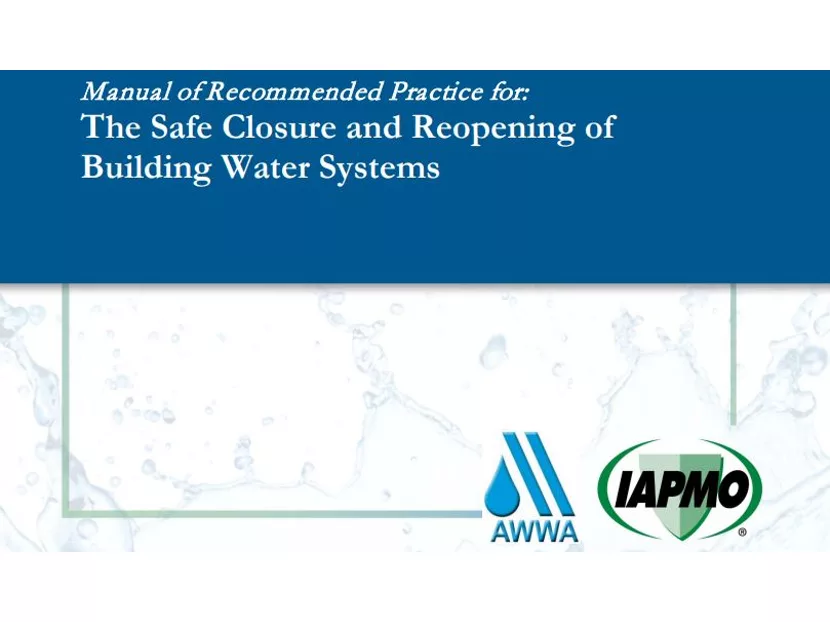The International Association of Plumbing and Mechanical Officials (IAPMO) and the American Water Works Association (AWWA) have published the AWWA/IAPMO Manual-2022: Manual of Recommended Practices for the Safe Closure and Reopening of Building Water Systems. On July 29, 2020, IAPMO and AWWA entered into a Cooperative Development Agreement to develop a manual of recommended practice to support providing safe and effective water efficiency and water quality provisions for the built environment.
This collaboration led to the development of risk management practices for potable and non-potable water supply systems during normal operation, when closing, during interruptions to normal operation, and when reopening building water systems in specific occupancy types. Section 4 of the manual applies to potable water systems, nonpotable water systems, and mechanical systems; Section 5 applies to potable water systems; Section 6 applies to nonpotable water systems; and Section 7 applies to mechanical systems.
This manual of recommended practice is intended to provide expert guidance on building water system safety. It provides sound and effective risk management practices for preparing water systems when buildings must be shut down or put into low-use modes, “exercising” building water systems during periods of no or low use and evaluating and preparing water systems for reopening.
As the world continues to emerge from the COVID-19 pandemic, there will be countless studies that will consider where proactive efforts could have reduced the resulting health and safety and economic related impacts. The pandemic prompted rethinking of some common practices. In the manual’s case, this meant evaluating construction practices.
“Indeed, as a society we have learned a great deal and we will be better prepared for the next time we will need to respond to a similar threat on a global or regional scale, but only if we take the time to capture the recommended practices that are identified and put them into practice.” — excerpted from the manual
IAPMO and AWWA, along with a group of experts across the nation, took steps to address this goal with the creation of a practices manual for the safe closure and reopening of building water systems. The manual provides sound and effective risk management practices for preparing the potable water system, nonpotable water system and cooling towers.
“This manual will serve as a practical reference for repeatable and reliable methods to manage building operations through a full range of challenges” said Rich Benkowski, UA Department of Education consultant, who also chaired the working group of technical experts. “Whether the building is shut down for the long or the short term or remains partially occupied, facilities teams can address security and resilience for all piped systems using techniques developed with public health in mind.”
“The collaboration of municipal water quality experts from AWWA and premise plumbing water quality experts from IAPMO has resulted in a great collection of risk management practices for enhancing public health and building water system safety,” said Paul Olson, AWWA senior manager of standards. “We are very pleased to have worked with IAPMO in bringing these experts together for this important effort.”
The AWWA/IAPMO manual is available for free download HERE.





